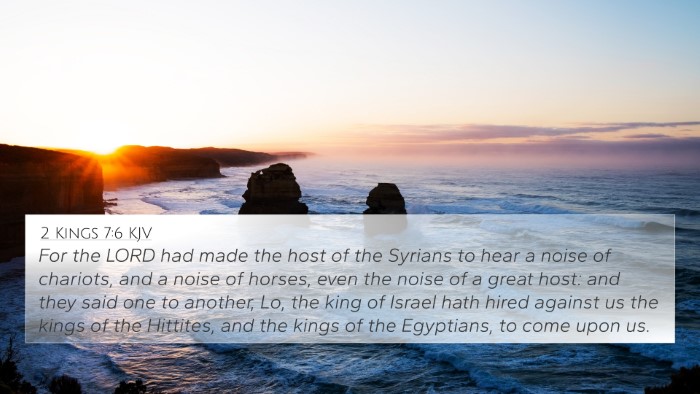Understanding Isaiah 37:7
Isaiah 37:7 states: "Behold, I will put a spirit in him, and he shall hear a rumor and return to his own land; and I will cause him to fall by the sword in his own land." This verse conveys a powerful message about divine intervention and the sovereignty of God in the affairs of nations and individuals.
Commentary Insights
Matthew Henry's Commentary
Matthew Henry suggests that this verse reflects God's control over the hearts of kings and rulers. He emphasizes that divine providence orchestrates events, including motivating enemies to return to their own lands. Henry illustrates that the "spirit" referred to in this verse indicates a deep-seated change in mindset leading to an inevitable outcome - the downfall of the enemy.
Albert Barnes' Notes
Albert Barnes elaborates on the context of this prophetic promise. He interprets the message as reassurance to King Hezekiah, implying that God will disrupt the plans of Sennacherib, the Assyrian king. Barnes notes that the mention of a "rumor" signifies a catalyst that catalyzes fear and confusion among the adversaries, leading them to retreat. This serves as an affirmation of faith in divine power over worldly conflicts.
Adam Clarke's Commentary
Adam Clarke emphasizes the melancholic yet hopeful nature of prophecy in this verse. He explains that God assures Hezekiah that the war will turn back upon itself, and those who threaten the nation will meet their demise. Clarke remarks that the "sword" symbolizes judgment, hinting at the moral responsibility that leaders bear. The ultimate outcome reveals God's justice and protection over His people.
Thematic Connections
Isaiah 37:7 illustrates several themes that resonate throughout Scripture, including divine intervention, judgment, and the assurance of God’s protection. This verse serves as a reminder of the connections between God's promises and His actions throughout history.
Bible Verse Cross-References
Here are some relevant cross-referenced scriptures that tie into Isaiah 37:7:
- 2 Kings 19:7 - God’s promise to defeat the Assyrian army.
- Isaiah 36:6 - The Assyrian threats against Jerusalem.
- Psalm 37:12-15 - The wicked plotting against the righteous.
- Jeremiah 51:24 - God’s vengeance on Babylon.
- Proverbs 21:1 - The heart of the king is in God’s hands.
- Isaiah 10:12 - God’s judgment on Assyria.
- Isaiah 31:4 - God’s protection compared to a lion’s presence among its prey.
Exploring Cross-References in the Bible
Understanding the connections between Bible verses is essential for grasping the broader context and themes of Scripture. By exploring the connections between Bible verses, especially in prophetic literature, one can glean deeper insights into God's character and His plans for humanity.
Benefits of Cross-Referencing Biblical Texts
-
Enhanced Understanding: Cross-referencing enriches comprehension of complex biblical themes and messages.
-
Thematic Analysis: It aids in identifying recurring themes, such as God's justice, mercy, and protection.
-
Contextual Clarity: Cross-referencing helps provide clarity regarding the historical and cultural context of particular verses.
Practical Tools for Bible Cross-Referencing
Utilizing tools for Bible cross-referencing such as Bible concordances and Bible cross-reference guides can significantly streamline the study process. These resources facilitate the identification of relevant scriptures and help enhance the study of inter-relational themes across both the Old and New Testaments.
How to Use Bible Cross-References
- Start with a scripture verse of interest.
- Utilize a concordance to find related verses.
- Compare the context and themes of these verses.
- Look for patterns and thematic connections.
Conclusion
Isaiah 37:7 is a profound testament to God's sovereignty and His ability to control earthly affairs for the preservation of His people. By employing cross-referencing methods, believers can discover a wealth of related scriptures, enhancing their understanding and appreciation of God's Word. Engaging in comparative Bible verse analysis allows us to appreciate the harmony and coherence of Scripture, leading to a deeper faith and trust in God’s plans.
















